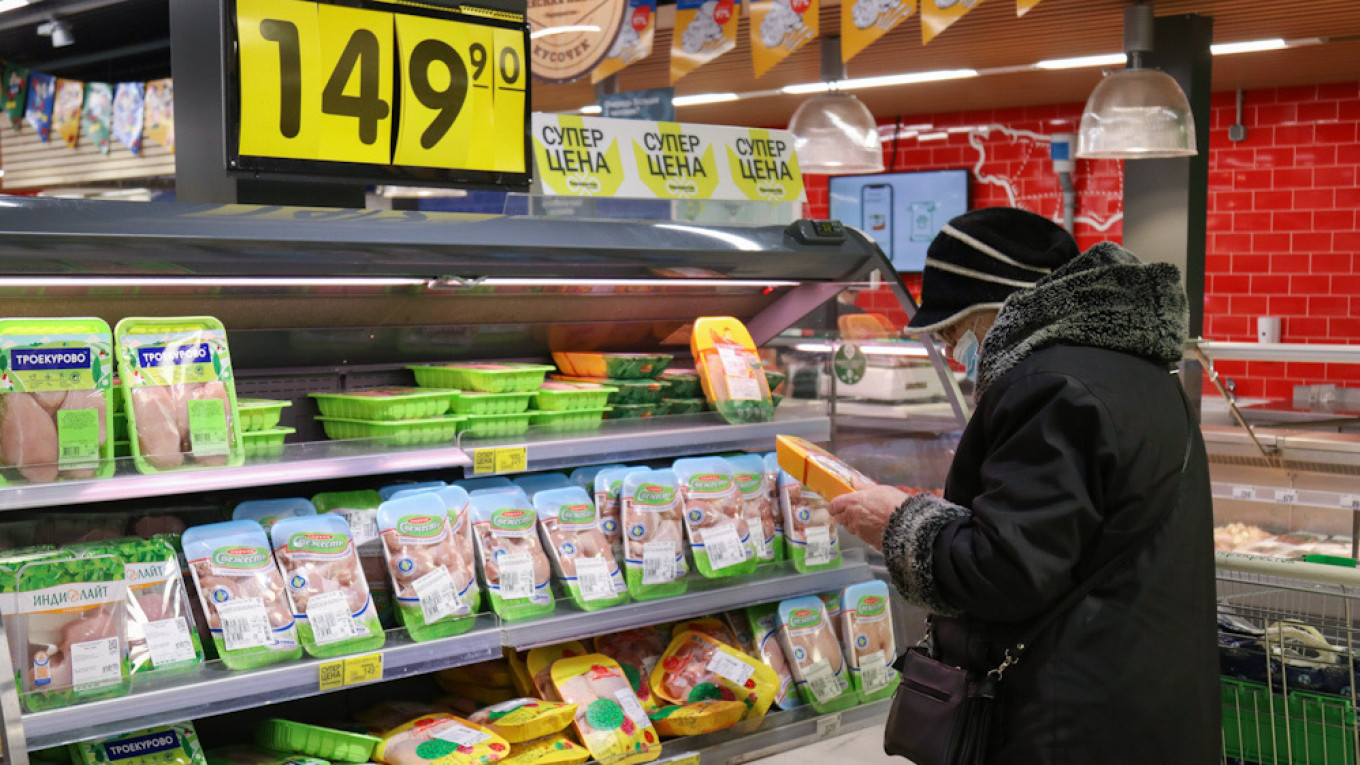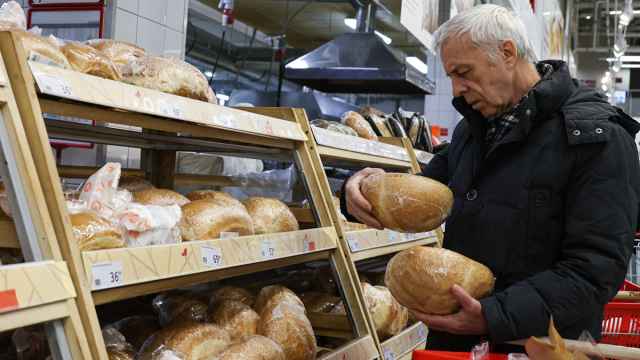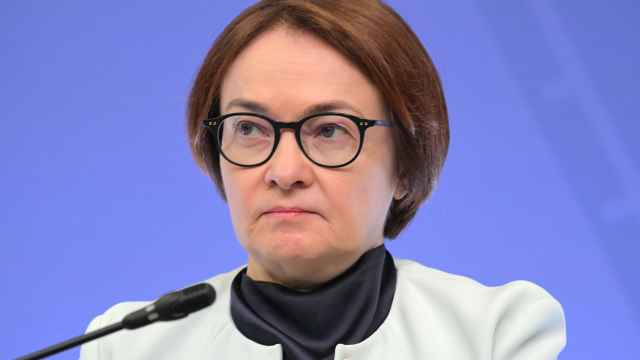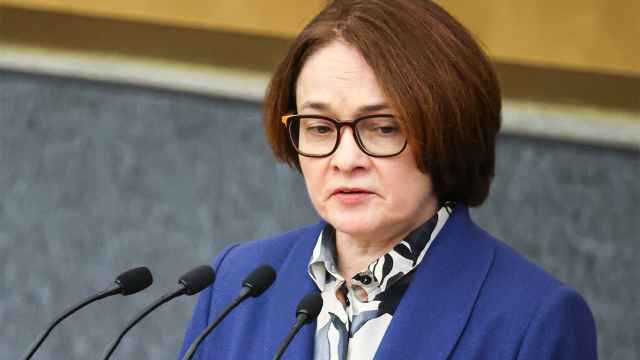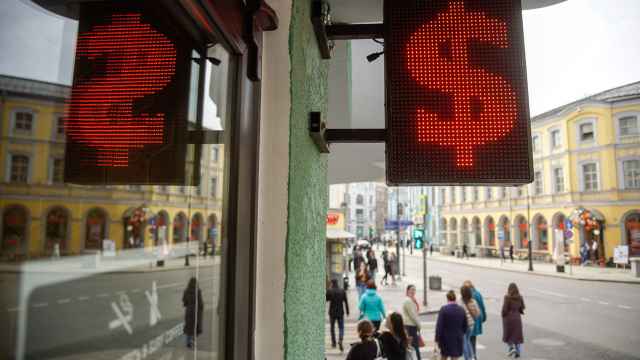Russian Prime Minister Mikhail Mishustin has attacked businesses for pushing inflation upward through profiteering and threatened retaliatory measures from the government if firms do not stop increasing prices.
In an address to lawmakers Wednesday, Mishustin said corporate “greed” was behind the inflation surge which has seen Russia’s Central Bank forced to hike interest rates, put the Kremlin on edge ahead of this fall’s parliamentary elections and threatened to undermine Russia’s economic recovery from the coronavirus pandemic.
“It is important to note one reason why prices are rising is greed. The greed of individual producers and retail chains,” Mishustin said to applause from parliamentarians.
“I want to remind them that the government has enough instruments to curb the appetites of those who are seeking to profit from the hype,” he added.
The comments were the latest escalation in the government's efforts to publicly address rising prices as inflation in Russia runs close to its highest level since 2016, putting increasing pressure on Russians’ wallets.
For months the government has sought to tame rising food prices by installing export quotas, capping prices and haranguing producers to bring down costs in choreographed televised meetings between government officials and industry leaders.
But inflation has proved stubborn and — worryingly for lawmakers who have eyes on elections to the State Duma in September — is now being seen across a host of consumer products, not just food.
Overall inflation ticked down to 5.5% in annual terms in April, Russia’s federal statistics agency Rosstat said last week. But “core inflation” — a measure which strips out the most volatile prices and is used by policymakers and central banks as a more reliable indicator of price fluctuations over the medium- and longer-term — continued to rise. Prices for non-food goods — a broad category covering things like gas, clothes, furniture, cars and tobacco — are up 6.2% over the last 12 months.
Rising prices are heaping more pressure on already struggling Russian households. Real disposable incomes fell 3.6% in the first quarter of the year to a new decade low and financial data shows Russians have started eating into their savings to fund everyday purchases.
Inflation expectations, which tracks how fast people expect prices to rise in the future, jumped sharply from 10.1% in March to 11.9% in April. Surveys also show Russians believe inflation is running almost three times its official rate — at 14.5% in annual terms — according to a measure of so-called “observed inflation.”
Central Bank dilemma
Inflation is a particularly sensitive subject in Russia, given the fall in living standards since 2013 and memories of multiple economic crises and devaluations over the past quarter-century.
Contrary to Mishustin’s assessments, economists say a combination of global factors — such as surging commodity and food prices and huge economic stimulus packages in advanced countries as well as the devaluation of the ruble and supply chain disruption — is behind the rise in prices.
Sova Capital’s Chief Economist Artem Zaigrin said the price rises are the impact of coronavirus lockdowns and the 20% decline in the ruble’s value since last February finally catching up with the market.
“The main reasons for the pickup in such prices could be the pass-through of higher costs from producers to consumers due to the weaker exchange rate,” he said.
“That could be amplified by supply-and-demand mismatches after Covid-19 disrupted supply chains,” he added, referencing shortfalls in manufactured goods such as low-end computers, bicycles and automobiles.
Alongside the government’s forceful rhetoric, the Central Bank has responded quickly to the inflation crisis, hiking interest rates from 4.25% to 5% this year — faster than market expectations. It has also signaled it is set to pursue an aggressive path of “normalization,” which will likely include at least two more hikes this year, according to an interest rate forecast published by the Bank for the first time ever last month.
But raising interest rates threatens to choke off growth — something Russia has struggled with for a decade. Annual growth has not surpassed 2.5% since 2012 — the last year in which the Russian economy grew faster than the global average.
Familiar rivals to the Central Bank’s conservative approach, including the Economy Ministry, which is tasked with boosting Russia’s potential, have criticized the rate hikes. Economy Minister Maxim Reshetnikov said he fears higher interest rates will throttle investment and sap growth.
Rapid growth in credit also poses a challenge for the regulator as it seeks to balance rising inflation risks with a fragile economic recovery. The volume of outstanding bank loans has grown 15% over the last year, with borrowers taking out a record number of short-term high-interest payday loans during March. Higher interest rates means higher borrowing costs and more money going on servicing debts instead of saving, or buying products and services to stimulate the economy.
With elections later this year in which the ruling United Russia party is seeking to maintain its supermajority, some analysts have raised old concerns about whether the Bank will be allowed to pursue its goal of bringing inflation down to 4%, even if that means tighter monetary conditions.
T.S. Lombard’s Christopher Granville said he sees the current dynamics as “the sternest test of the Central Bank’s independence” since the 2014 crisis.
“A robust up-front policy response is now clearly needed to prevent inflation running out of control: but the timing of this policy challenge could hardly be more delicate,” he said.
For now, Central Bank head Elvira Nabiullina has been given cover from the very top to raise rates in a bid to rein in inflation — despite the implications that could have for household finances — with both Mishustin and President Vladimir Putin publicly saying rising prices are one of their top concerns.
“Put bluntly, the credibility test hinges on Putin’s continuing political support for Nabiullina,” Granville said.
The political and economic dynamics between the Kremlin and the Central Bank against the backdrop of the upcoming elections have been brought into even sharper focus due to the government’s own response to rising inflation — price caps and export quotas.
Nabiullina has been one of the loudest official critics of those policies, which have also been criticized by independent economists as potentially leading to product shortages and forcing businesses to operate at a loss. Any short-term gains in terms of lower prices could simply be storing up even sharper price rises for later on, which could force the Central Bank to raise rates faster than it would have had market forces been allowed to play out naturally, Granville said.
For policymakers, weeks away from polling day, that may play second fiddle.
“Of course nobody is completely satisfied with the results of the government’s price caps,” Mishustin said Wednesday. “But were it not for the measures taken, we would be discussing an explosive uncontrolled rise in prices.”
A Message from The Moscow Times:
Dear readers,
We are facing unprecedented challenges. Russia's Prosecutor General's Office has designated The Moscow Times as an "undesirable" organization, criminalizing our work and putting our staff at risk of prosecution. This follows our earlier unjust labeling as a "foreign agent."
These actions are direct attempts to silence independent journalism in Russia. The authorities claim our work "discredits the decisions of the Russian leadership." We see things differently: we strive to provide accurate, unbiased reporting on Russia.
We, the journalists of The Moscow Times, refuse to be silenced. But to continue our work, we need your help.
Your support, no matter how small, makes a world of difference. If you can, please support us monthly starting from just $2. It's quick to set up, and every contribution makes a significant impact.
By supporting The Moscow Times, you're defending open, independent journalism in the face of repression. Thank you for standing with us.
Remind me later.



